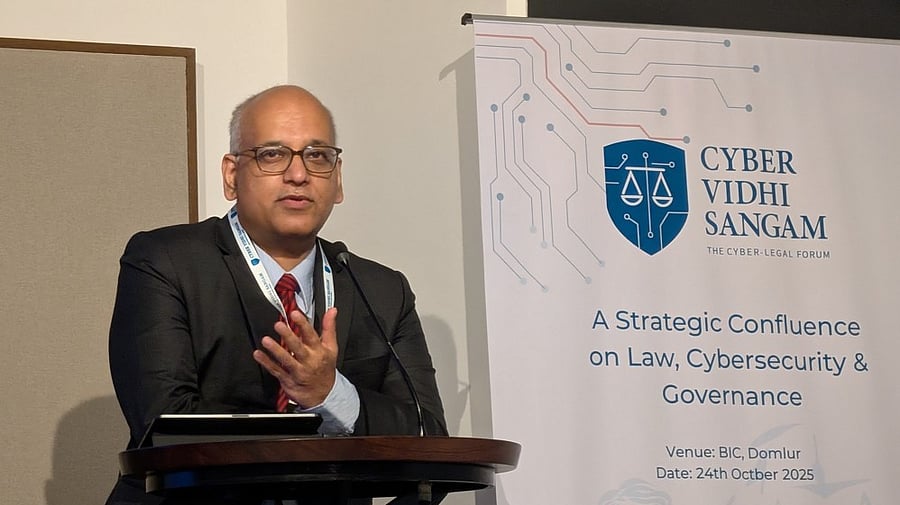
Dr Nigam Nuggehalli, Registrar-in-charge and Professor of Law at NLSIU speaking at the inaugural Cyber Vidhi Sangam event at Bangalore International Centre, on October 24, 2025.
Credit: DH Photo/KVN Rohit
Backed by the advancement of generative Artificial Intelligence tools, cybercrimes are evolving faster than ever. Besides that, there is growing insecurity among people about user data being harvested by private technology firms that offer services on mobile, for monetisation.
Even government agencies collect personal information for social welfare schemes, and people believe that data should be protected.
From data theft to digital deception through deepfakes, regulators aren’t just confronted with how to punish offenders, but also how to preserve trust in user privacy. These were the main talking points at the Cyber Vidhi Sangam Conclave 2025, a first-of-its-kind forum hosted by NLSIU (National Law School of India University) alumni.
"The area of cybersecurity and AI is fast developing and very happy that NLSIU is centre of it, in various different ways. We have a course on Diploma in cyber security and cyber forensics, that's been doing really good work for quite some time.... Law schools and practioners, both have a key role to play here. It is in this context, I am very happy, we are hosting the Cyber Vidhi Sangam. As the name suggests, it is confluence of people who are debating and discussing the cutting-edge technology and laws. It is a need of the hour, as we saw already, there are ways and issues, on which, where legal policy debates are not settled yet. It is important for us to get together, to use our collective talents and experience to seek solutions in these areas," said Dr Nigam Nuggehalli, Registrar-in-charge and Professor of Law at NLSIU.
From left to right: Sidharth Chauhan (Asst. Prof. and Asst. Dean-Research, NLSIU), Sachin Dhawan (Deputy Director, The Dialogue), enterprise privacy leader Sandeep Kumar Akkimolla (ANSR), and Data protection counsel Shloka Narayanan (Poovayya & Co.) at Cyber Vidhi Sangam event at Bangalore International Centre, on October 24, 2025.
Credit: DH Photo/KVN Rohit
How law and technology are necessary to co-evolve to protect citizens in a hyperconnected world
In the panel consisting of Sachin Dhawan (Deputy Director, The Dialogue), data protection counsel Shloka Narayanan (Poovayya & Co.), enterprise privacy leader Sandeep Kumar Akkimolla (ANSR), and moderated by Prof. Sidharth Chauhan (Asst. Prof. and Asst. Dean-Research, NLSIU), the broad consensus was that the Digital Personal Data Protection Act, which saw multiple revisions of drafts, was in the right direction.
Though it is not perfect, it can always be improvised, as we learn to pick things from fast-evolving technologies.
Also, the data localisation law, though a bit late to arrive, will ensure legal protection to the user data of Indian citizens, and companies must comply with it.
The rapid rate of advancement of gen AI is helping threat actors to create malware APKs, and this has fundamentally changed the pattern of cyber crimes worldwide.
Dr A Nagarathna (Associate Professor of Law, NLSIU) consisted of Anuj Bhansali (VP Trust & Safety, PhonePe), Rahul Sasi (Co-Founder & CEO, CloudSEK), and Dr. Fakkeerappa Kaginelli, IPS (DIG Law and Order, Andhra Pradesh State) at Cyber Vidhi Sangam event, in Bangalore International Centre, on October 24, 2025.
Credit: DH Photo/KVN Rohit
Even with the slightest slip of mind, one can lose their hard-earned money in just a few minutes to cyber criminals.
In the second session, panel moderated by Dr A Nagarathna (Associate Professor of Law, NLSIU) consisted of Anuj Bhansali (VP Trust & Safety, PhonePe), Rahul Sasi (Co-Founder & CEO, CloudSEK), and Dr. Fakkeerappa Kaginelli, IPS (DIG Law and Order, Andhra Pradesh State), offered insightful inputs on how AI is being used by both cyber defenders and criminals..
Teenagers with a bare minimum knowledge of technology can use Gen AI applications to build malware-laced applications to prey on naive smartphone users.
Indian police agencies, have been slowly, steadily improving the methods to solve cybercrimes committed by inter-state fraudsters.
However, crimes committed by scam centres run overseas in Cambodia, Thailand and Malaysia, or North Korea are difficult to prosecute due to a lack of legal cooperation between international government agencies.
Until such inter-governmental collaboration is achieved, users are advised to practice digital hygiene to avoid falling prey to cyber crimes.
Also, the government should take up the responsibility to procure advanced cybersecurity tools and regularly host educational camps for police officers to improve their skill sets.
Further, the government has to conduct more awareness programmes on multiple platforms, such as social media, TV ads, and regularly schedule cyber camps at schools to educate children about dangers lurking online.
And, the government should continually review and change policies on AI and cybercrime with the fast-evolving technologies.
Get the latest news on new launches, gadget reviews, apps, cybersecurity, and more on personal technology only on DH Tech
